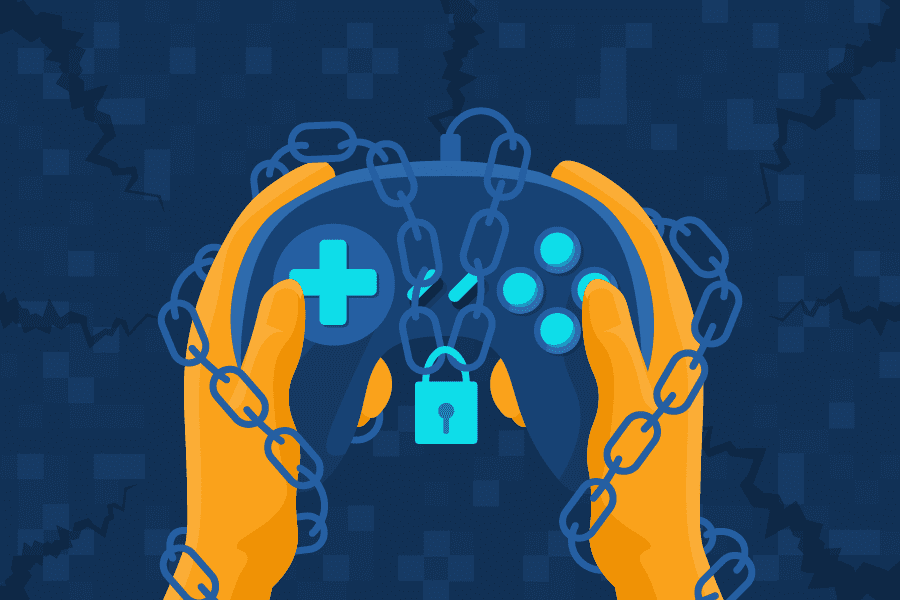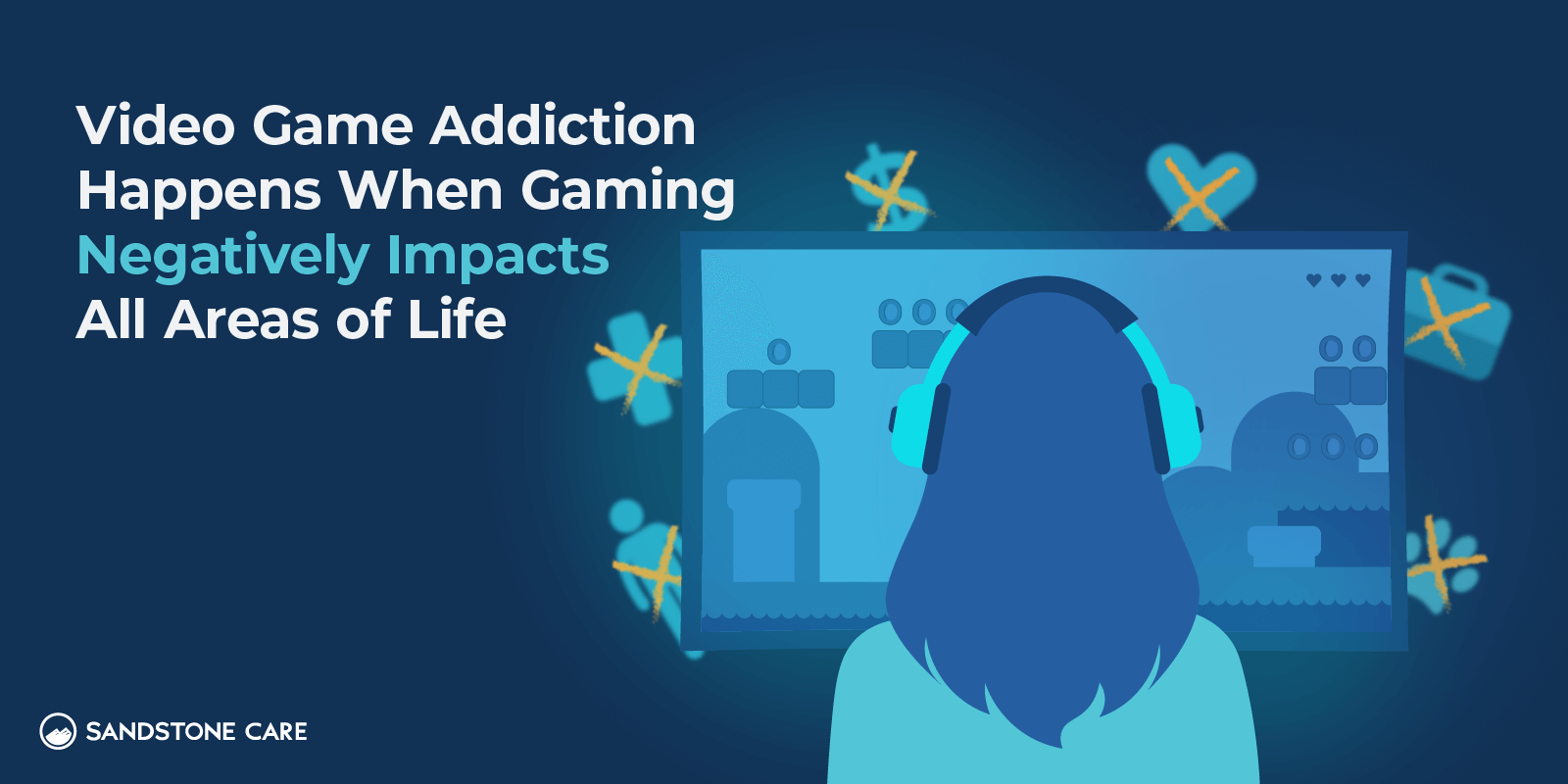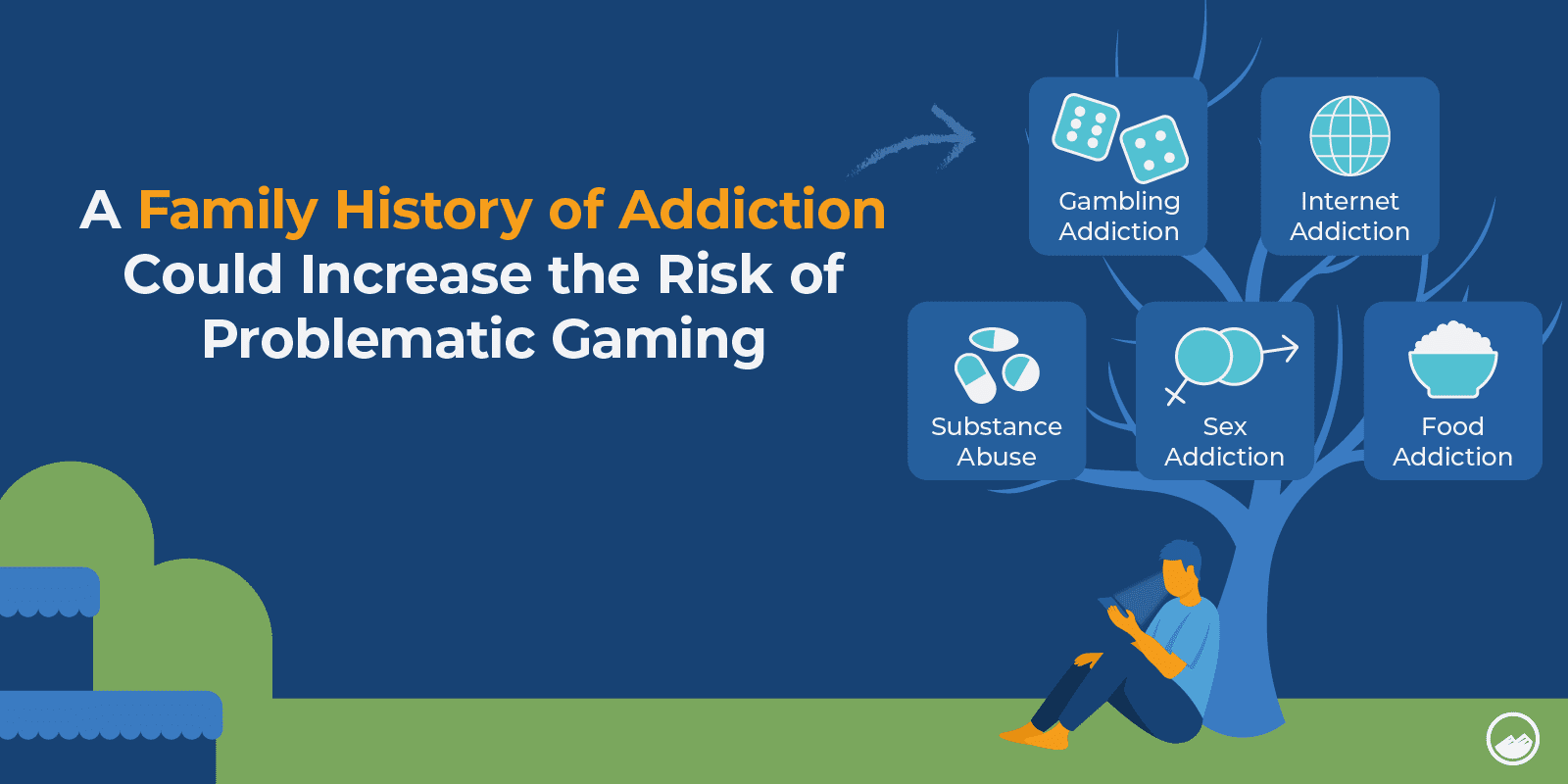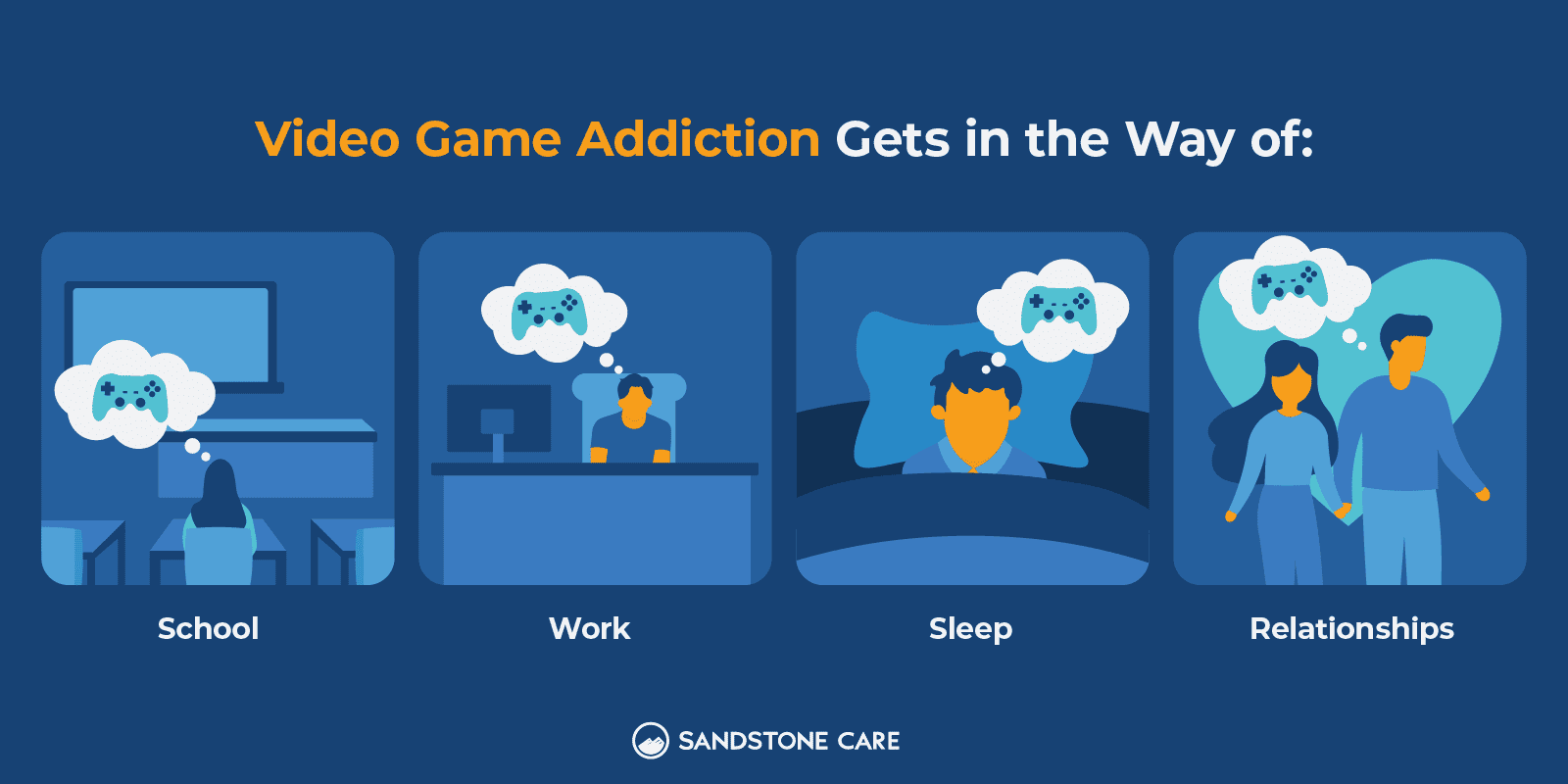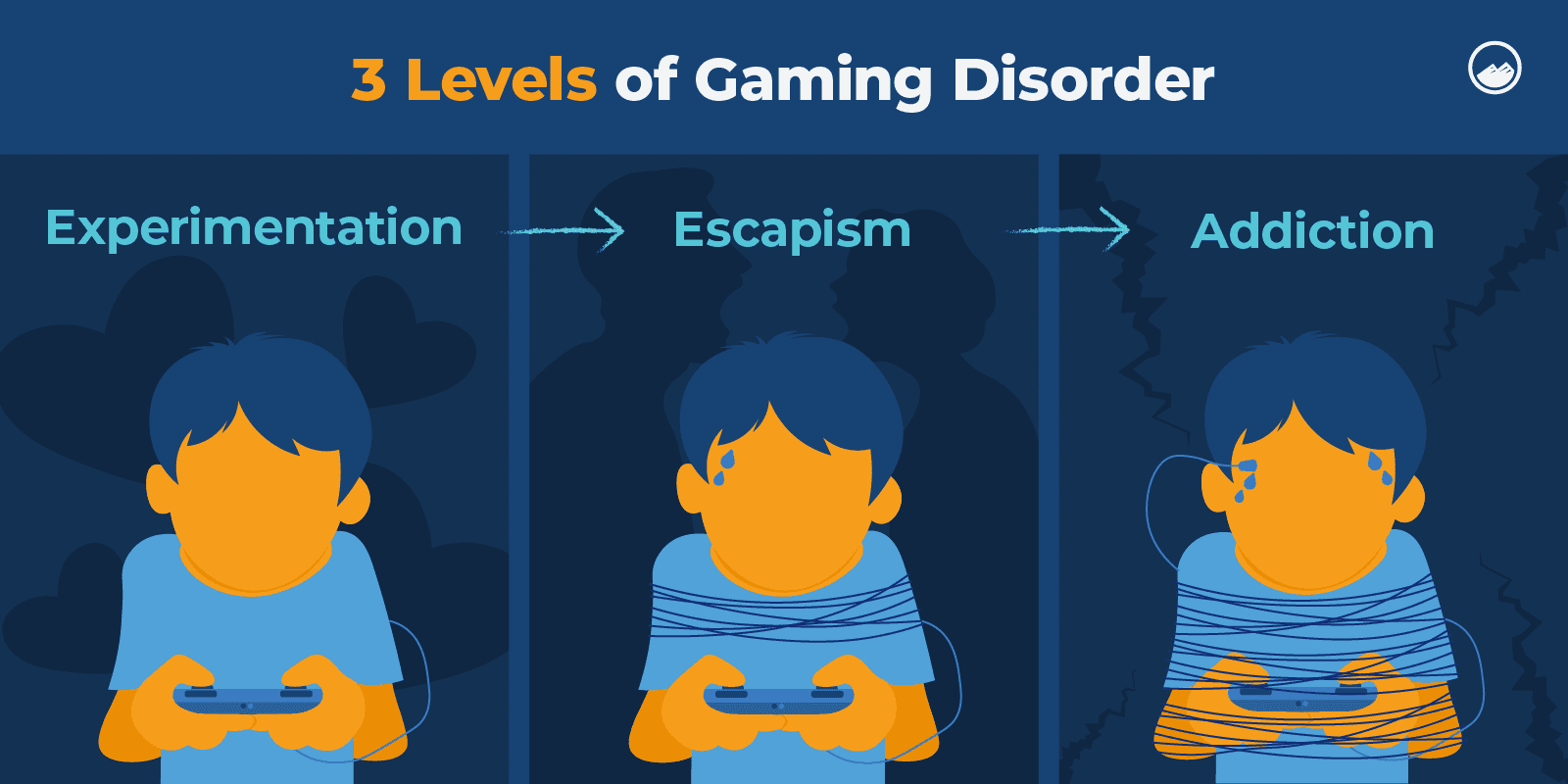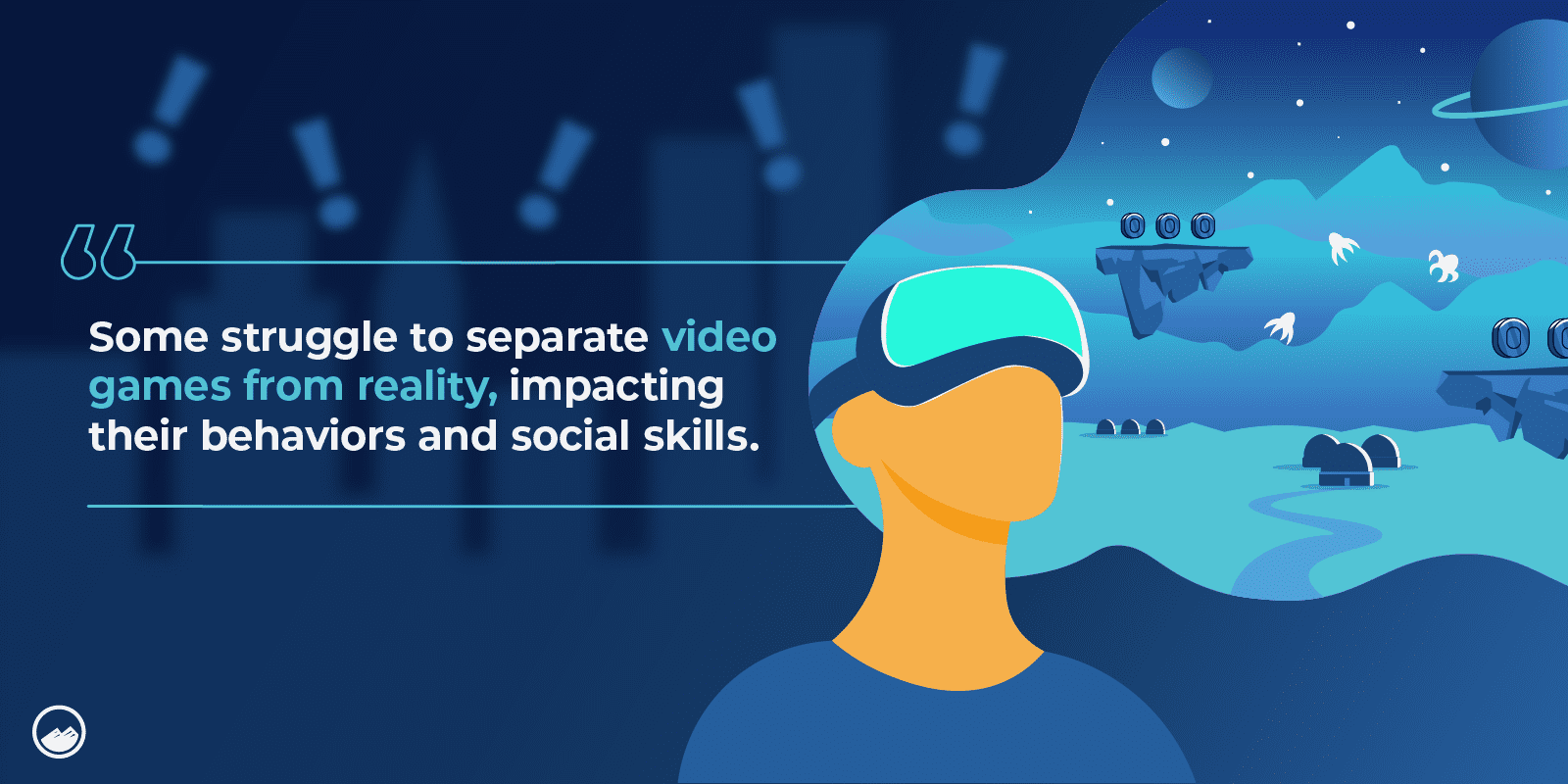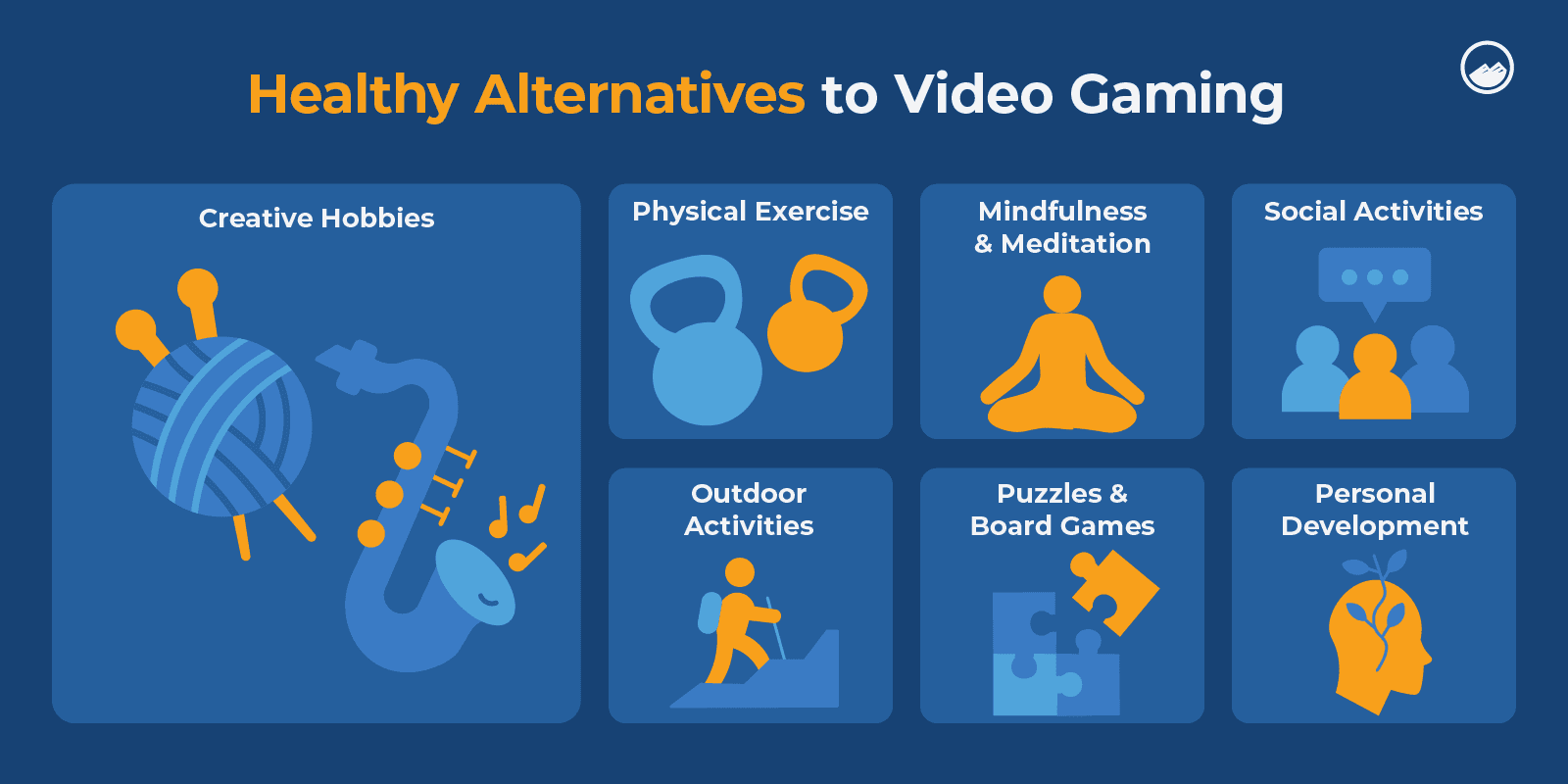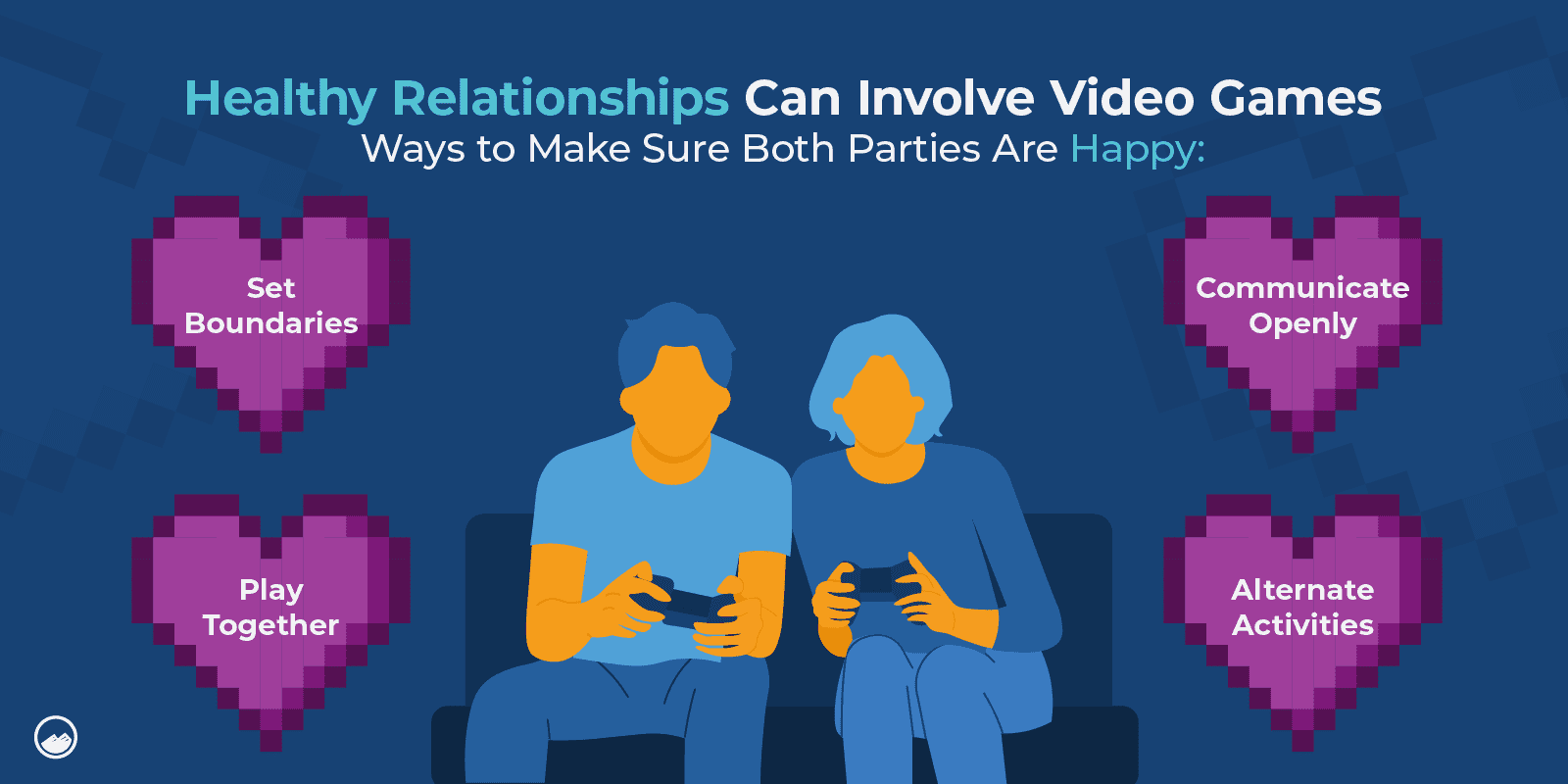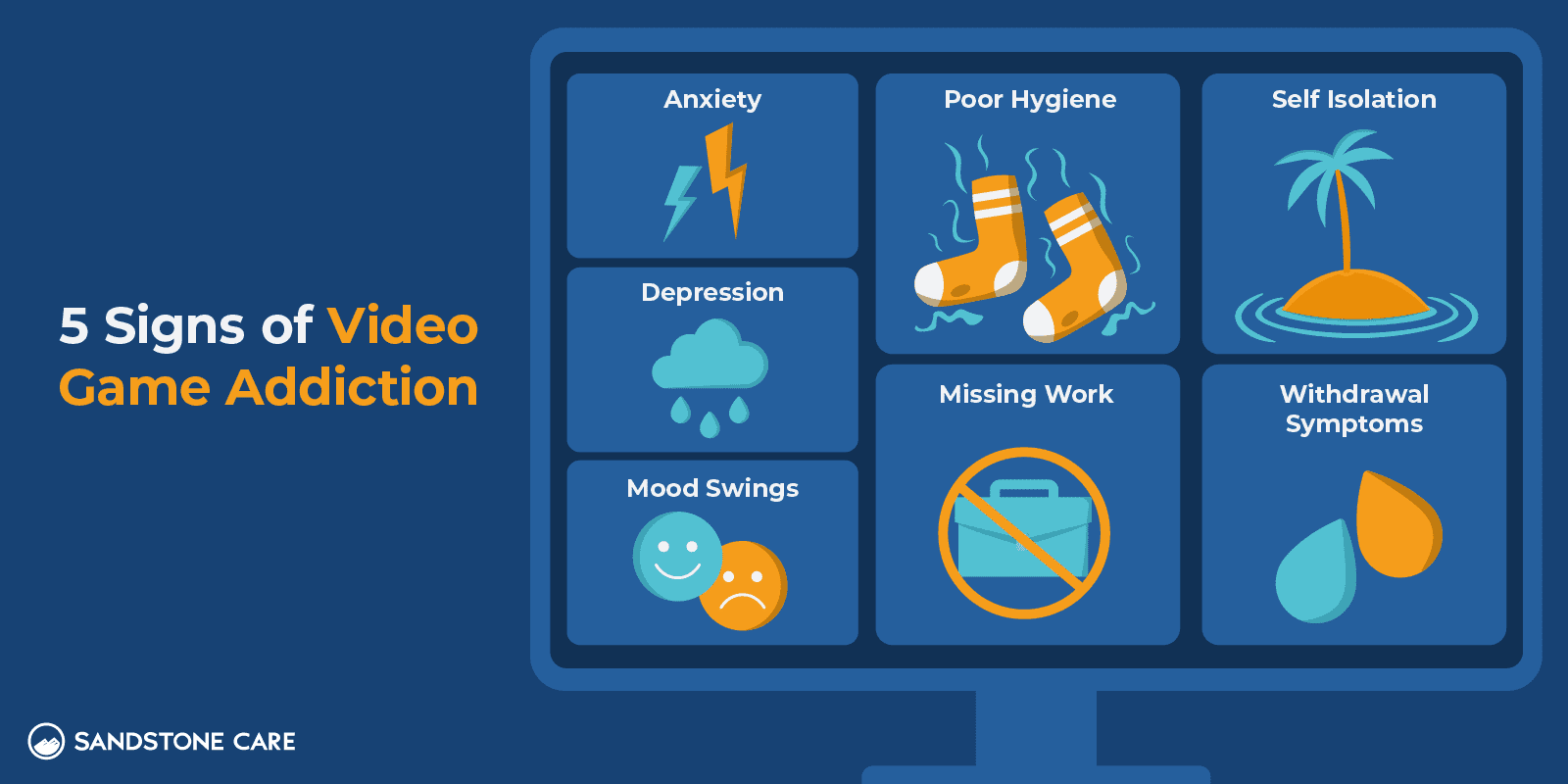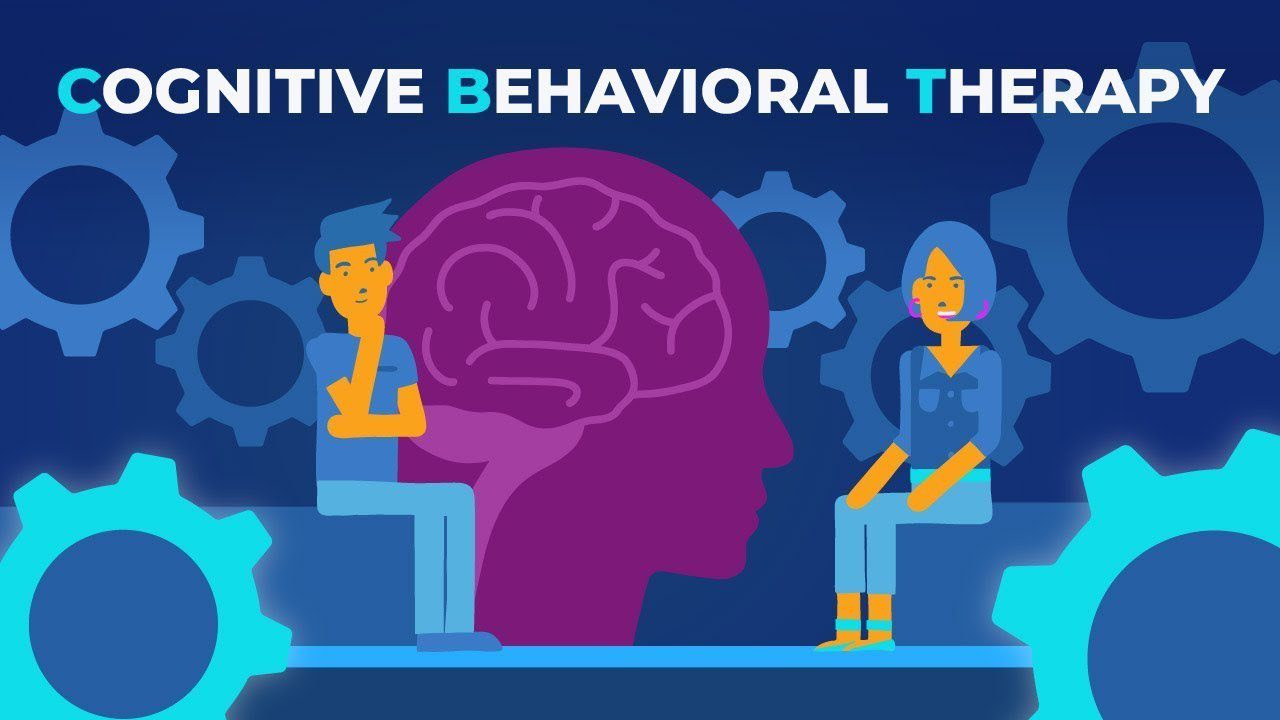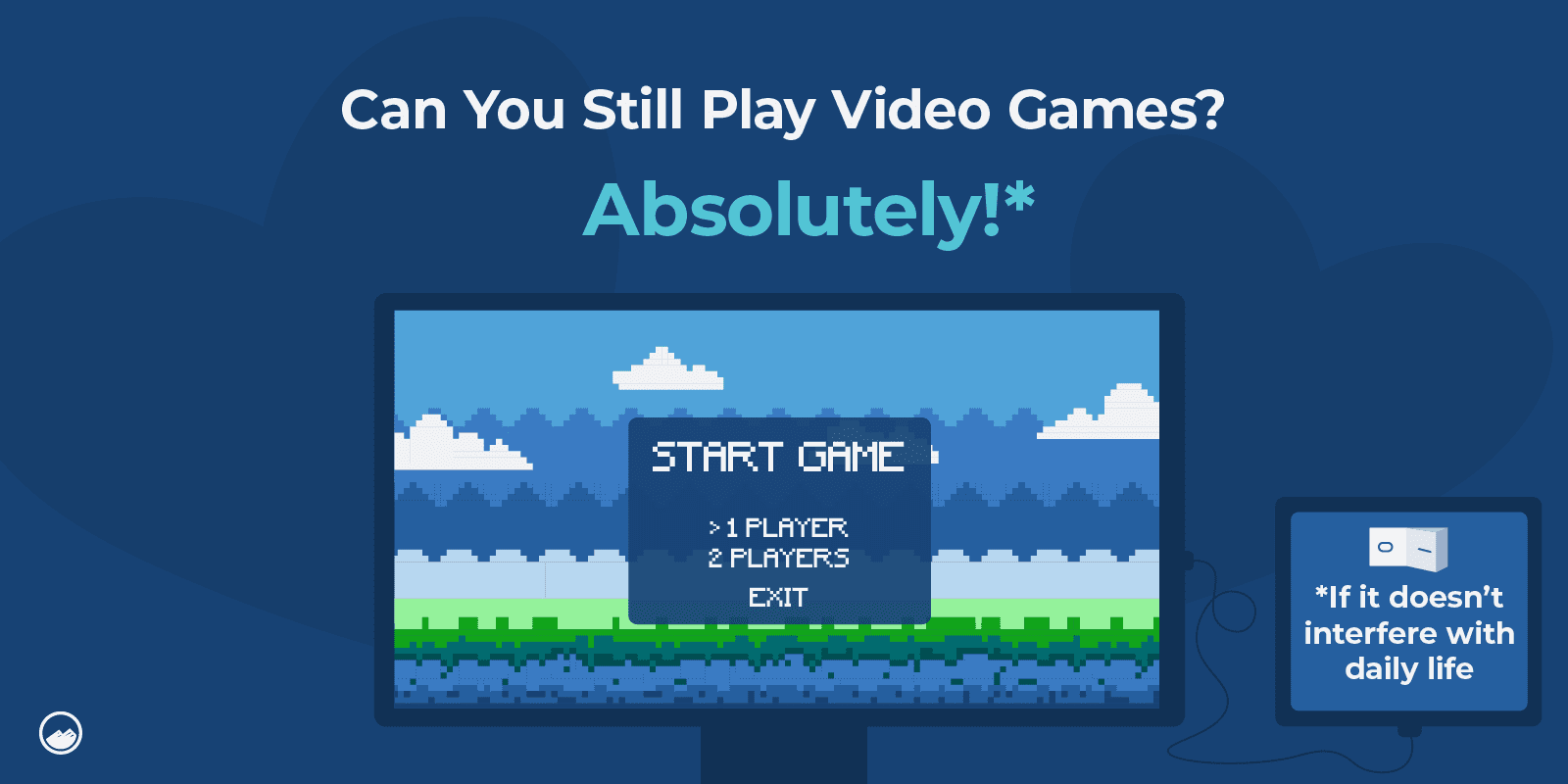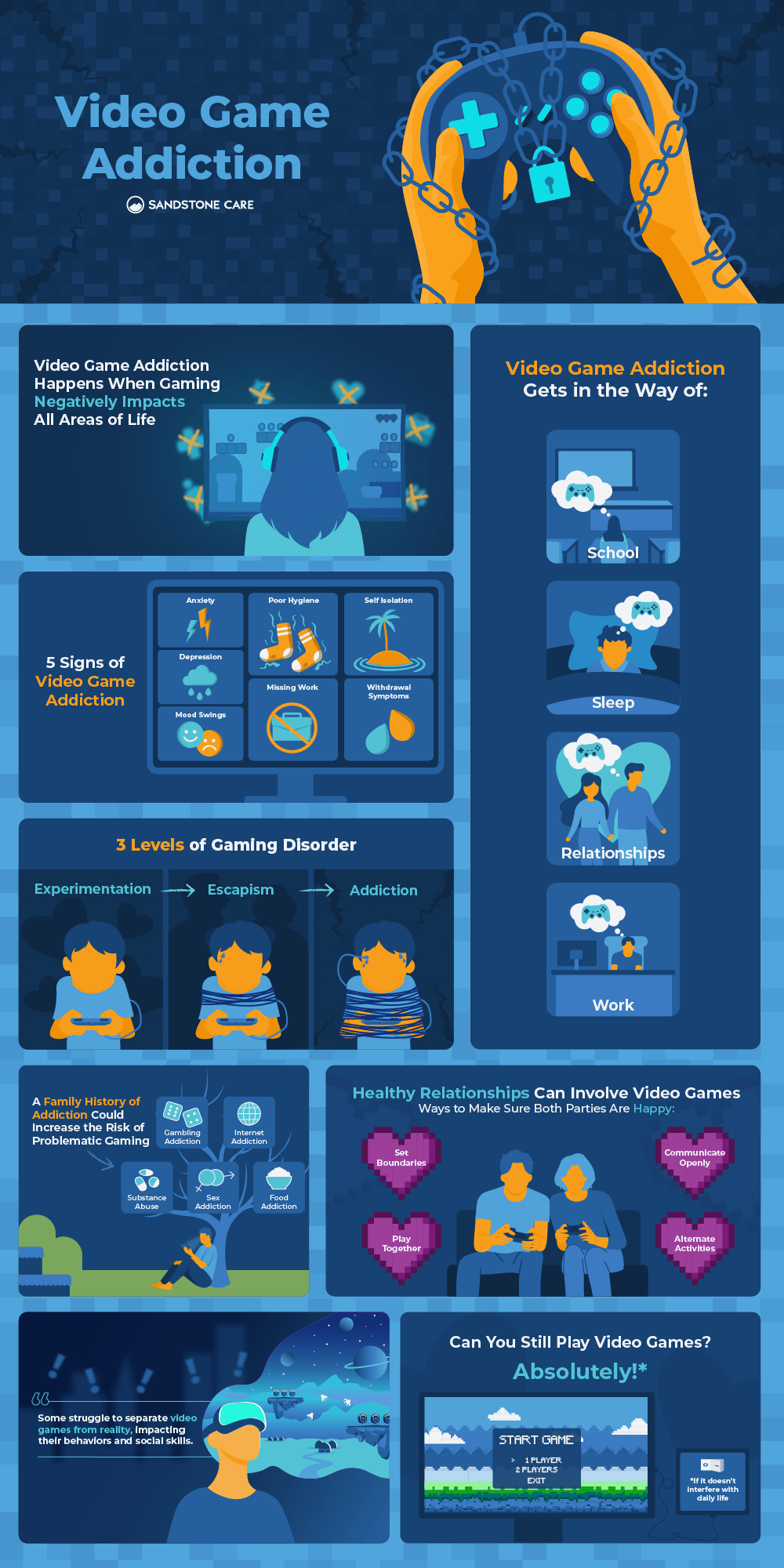Understanding the Effects of Video Game Addiction
Is Video Game Addiction Real?
Video game addiction is a real mental health condition characterized by symptoms like constant preoccupation with gaming, withdrawal symptoms when not playing, and the need to game more for the same satisfaction.
People with this addiction may try unsuccessfully to cut back on gaming, lose interest in other activities, and continue gaming despite problems it causes. This can harm academic performance, relationships, mental health, and physical well-being.
This addiction was previously referred to as “Internet Gaming Disorder” (IGD) and is listed in the Diagnostic and Statistical Manual of Mental Disorders (DSM-5).
It’s also recognized by the World Health Organization (WHO) in the International Classification of Diseases (ICD-11.)
Are Video Games Addictive?
Despite the widespread popularity of video games and gaming culture, some video games can be addictive.
However, not all people who play video games will necessarily develop a video game addiction. Depending on how the games are developed, some video games or apps may contain more addictive qualities than others, especially with the introduction of “lootboxes” or other predatory, gambling-like practices.
IGD also more commonly develops around online multiplayer games rather than single-player narrative experiences.
What Causes Video Game Addiction?
Various factors can inform an addiction to video games or online gaming. Each person will need to address their relationship with video games to determine the cause behind addiction.
Some of the potential causes include:
- Need for escapism, especially when faced with a stressful daily life, stressful home environment, trauma, or other personal challenges
- The release of dopamine in the brain
- Providing a sense of instant gratification or accomplishment
- Difficulty connecting to others resulting in social needs being ignored in favor of video games
Those who have a family history of addictive behaviors are more likely to have problematic gaming behaviors
Also, some dopamine-seeking mental health conditions such as attention-deficit hyperactivity disorder (ADHD) may be at a higher risk of developing a gaming addiction.
Causes of Video Game Addiction
What Is the Root Cause of Gaming Addiction?
The root cause of video game addiction comes from using video games to release dopamine, or the “feel good” chemical in the brain. This rewards the brain for game playing.
Over time, the body adjusts to the level of dopamine that has entered its system, and eventually struggles to reach happy levels without constant rewards. This can develop a healthy hobby into a harmful addiction.
At What Point Does Gaming Become an Addiction?
Gaming becomes an addiction when it significantly interferes with daily life, leads to neglect of responsibilities, and persists despite negative consequences.
It’s important to note that not all people who play video games are addicted, and it is normal to get engrossed in a good game occasionally.
Some signs that gaming has become an addiction include:
- Consistently showing up late to work or school
- Struggling to focus on things beyond the video game
- Experiencing withdrawals when the game is not available
- Struggling to get enough sleep, or sleeping too much
- Showing a lack of interest in social relationships
What Age Does Gaming Addiction Start?
The age when video game addiction starts varies from person to person, but those who play excessive video games during their developmental years are more likely to be gaming addicts as young people.
Children exposed to video games from a young age may be at an increased risk of developing an internet addiction. The average age of most active gamers is teenagers to those in their 30s.
However, addiction can affect people of any age. For some, retired adults may find the newfound wealth of free time can encourage the use of video games or addictive apps to pass the time, which can develop into video game addiction.
Gaming Addiction Symptoms
Video game addiction can affect all areas of daily life. Recognizing the signs and symptoms of IGD can empower individuals, family members, and loved ones to pursue effective detox and treatment.
What Are the Stages of Gaming Disorder?
The stages of gaming disorder are experimentation, escapism, and addiction.
Gaming disorder develops over time. Recognizing the early warning signs of addiction can inform the efficient pursuit of professional treatment options to address gaming addiction.
The first stage, experimentation, is where video games are played for fun. Most people engage with video games in this way, and there is nothing wrong with pursuing video games as a hobby, with some people even finding video games to be part of an effective self-care plan.
However, the second stage is where video games are utilized not for fun but rather to escape other stresses.
An individual may not derive enjoyment from these games anymore but instead feel the escapism is necessary to avoid processing personal challenges or stress.
This stage is also where time spent engaging with video games can drastically increase.
Lastly, the final stage of the development of video game addiction is defined by video games no longer being fun nor effectively able to address other negative emotions.
Instead, they play video games because they feel like they have to. The individual may be compelled to engage in video games at the expense of other responsibilities, personal hygiene, and obligations, and this often leads to other negative effects.
What Can Too Much Gaming Do to You?
Excessive gaming can lead to impaired physical health, decreased social interaction, cognitive function decline, sleep disturbances, emotional and mental health issues, neglect of responsibilities, and developmental problems.
One of the symptoms of video game addiction is an increase in mental health problems. An increase in anger, frustration, and mood swings is also possible, along with compromised social skills.
Do Video Games Affect Behavior?
Excessive use of some video games can have an impact on a person’s behavior, especially among teens and young adults since their brain is still in a critical stage of development.
Depending on the age, it can be difficult for some to separate a fictitious video game world from the real world, which can affect how an individual interacts with others, as well as their acceptable social skills, behaviors, and more.
Likewise, excessive online gaming or the use of social media can also lead to changes in behavior as these digital environments have vastly different cultures than real-life social situations.
Video Games and Mental Health
Can Video Games Cause Psychological Problems?
Some who play video games show psychological problems, including an increase in anxiety, depression, irritation, mood swings, and more.
Pursuing treatment to address these negative effects with the support of healthcare professionals may be necessary to explore how video games impact each person’s mental health.
Is Gaming an Unhealthy Coping Mechanism?
Gaming can be an unhealthy coping mechanism when it is used to escape daily responsibilities and repress emotional needs.
Playing video games is not always an unhealthy way of navigating stress, and many even use video games as a part of a self-care plan.
However, when video games no longer provide relief from stress, begin to impede other responsibilities, or introduce stress, anxiety, or depression themselves, it can be beneficial to decrease or cease playing video games and develop other coping strategies.
How Long Does It Take for Your Brain to Recover From Video Games?
When excessive video game use or internet addiction sets in, it can take time for the brain to repair itself and rework how it releases dopamine.
For those overcoming video game addiction, this kind of video game detox can take about 90 days.
Can Video Games Cause Psychosis?
Some studies have shown that excessive video game use can be one of the major risk factors for developing psychosis, especially in younger age groups like teenagers and adolescents.
However, studies around video games and their effects on the development of psychosis are still limited in the public health field.
Can Video Games Cause PTSD?
Some video games have shown signs of impacting the development of post-traumatic stress disorder (PTSD.)
This depends on several factors, including personal experiences with the game, and is most common among the realistic first-person shooter (FPS) genre of games.
Can Video Games Cause Anxiety Disorders?
Those with IGD may experience a compromised ability to regulate emotions, which can lead to an increase in feelings of anxiety or the development of anxiety disorders.
However, the kind of video game being played, other sources of stress, home or social environments, and more all inform the development of anxiety disorders, and it is important to address all factors involved while creating a treatment plan.
Video Games and Relationships
Those with internet gaming addiction can have their relationships affected in a variety of ways.
Recognizing the potentially negative effects of video games on these relationships can be a reason to reach out for more information regarding video game addiction.
Do Video Games Affect Relationships?
Those who play video games excessively might find themselves isolated from others, which can have potentially disastrous effects on their close relationships.
Personal obligations may be ignored, or an individual may begin to choose video games over these relationships and adopt a more isolated lifestyle.
However, not all video games will negatively affect relationships, with some healthy relationships also involving video games.
How to Deal With a Loved One With Video Game Addiction
Respectfully discussing with loved ones their perspectives on their relationship with video games and their goals in playing them can be an important first step.
Seeking guidance from health professionals and mental health providers about addiction can further aid in understanding the impact of video games on the relationship.
How Much Is Too Much Gaming in a Relationship?
Too much gaming in a relationship is when it interferes with communication, quality time together, and the ability to fulfill responsibilities outside of gaming.
Each person will have a unique relationship with video games, and it is difficult to put an exact number of hours on what is “too much.”
How Do Video Games Affect Your Relationships With Family?
Not all who play video games will necessarily experience friction in their familial relationships, however, others may experience isolation, mood swings, anger, and strained relationships.
Teenage Video Game Addiction
How Long Should a Teenager Play Video Games Each Day?
It is normal for a person to play a few hours of video games a day, provided that this gaming does not interfere with other responsibilities.
If relationships, grades, responsibilities, and more become compromised, decreasing the allotted time gaming may be necessary to begin a conversation about video game addiction.
How Does Gaming Affect a Child’s Brain?
Gaming can influence a child’s brain by enhancing cognitive skills such as problem-solving, and coordination, but excessive gaming can lead to problems like poor academic performance, social isolation, disrupted sleep, and more.
Some video games can help children develop new skills, such as pattern recognition, or can be used as teaching aids. Delving into narrative video games as character studies can also be a positive way to utilize video games.
However, unhealthy, excessive use of video games, or relying on video games to soothe children, can cause these games to hijack the brain’s reward systems that release dopamine and can program the brain to rely on the instant gratification of games, leading addiction later in life.
What Happens if Kids Play Too Much Video Games?
If kids play too many video games, it may cause damage to eyesight, aches and pains, affect social skills, and can even affect a child’s ability to focus, especially in cases involving ADHD.
Excessive video game use in youth can also inform the development of IGD, increasing the risk of addiction and the need for professional treatment if IGD is diagnosed.
Video Game Addiction in Adults
How Many Hours of Video Games Is Healthy for Adults?
For adults, it’s important to balance video game time with other activities like exercise, socializing, and relaxation, so a few hours of gaming per day is generally considered healthy.
However, some longer gaming sessions, especially when done as a social activity, can be healthy as long as it does not interfere with other parts of the gamer’s life.
What Are Signs of Video Game Addiction in Adults?
Some signs of video game addiction in adults can include:
- Self-isolation
- Compromised personal hygiene
- Consistently calling out from work to play games
- Withdrawal symptoms when games are not available
- Increase in anxiety, depression, anger, or mood swings
- Feeling like video games are “necessary” or are prioritized over other responsibilities or coping strategies
Video Game Addiction Statistics
How Many Hours of Video Games Is an Addiction?
It is recommended to keep the number of hours gaming per day to around two.
However, there is no definite number of hours that constitute video game addiction, with addiction instead defined by how video games affect daily life.
Rather than focusing on a concrete amount of time, it is important to consider how gaming influences a person’s friendships, work and school performance, and self-esteem.
How Common Is Video Game Addiction?
Studies around video game addiction are still relatively new. However, it is estimated that about three percent of people who play video games show signs of potential video game addiction.
What Age Group Has the Most Gamers?
The most common age group of those who play video games consists of teenagers to around 35.
However, video games are available to all, with apps on phones or more accessible games reaching a much wider demographic.
Video Game Addiction Treatment
Is It Good to Quit Video Games?
Exploring each person’s relationship with video games alongside professionals can help each person decide if video games are having an adverse effect on daily life and if ceasing video games is necessary.
Not all who play video games experience video game addiction, and for some, playing video games can be a great way to relieve stress, relax, or even hang out with friends.
How to Prevent Gaming Addiction
To help prevent gaming addiction, it is important to build a safe and supportive home atmosphere and social environment, as well as encouraging the use of a variety of different coping strategies can all help prevent a reliance on video games.
How to Address Video Game Addiction
Video game addiction can always be addressed with professional psychiatry. Common ways of overcoming video game addiction include cognitive behavioral therapy (CBT) along with personalized treatment plans to address cravings and the daily impairments that video games cause to daily life.
What Can I Replace Video Games With?
Pursuing other hobbies, staying physically active, joining sports, and more are all common alternatives to gaming.
However, it is important to avoid replacing video games with a single alternative. Instead, it is best to explore many options to prevent yourself from replacing one addiction with another.
Is It OK to Still Play Video Games?
Absolutely! As long as video games are not interfering with your ability to process emotions and operate in your daily life, there is no reason to try to cut them out altogether.
However, those diagnosed with video game addiction may look to avoid returning to video games to prevent slips or relapse in these situations.
What Happens to Your Brain When You Quit Gaming?
Those diagnosed with video game addiction may have had their brain’s reward center, responsible for releasing dopamine into the brain, dictated by video games.
While it takes time, ceasing video games in treatment for video game addiction can provide the brain time to rewire itself and return to a healthier homeostasis.

